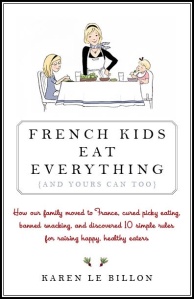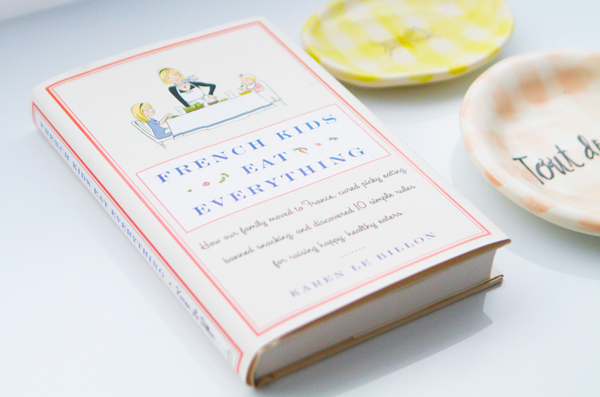by Mandy Beem-Miller
 French Kids Eat Everything is a journey: part memoir, part research analysis, with a touch of “self help” mixed in, following author Karen Le Billion and her family as they relocate to France. The one-year experiment begins with a self-admitted romantic vision of French life and a legitimate desire to expose her young family to a new cultural experience. But, it quickly becomes apparent that fresh baguettes and butter -while enticing even to her young daughters, is not solely what the French experience is made of. Vacationing is not the same as living in her French husband’s quaint seaside home town. The reality sets in when the children are enrolled in school. Seven year old Sophie and three-year old Claire are faced with an entirely new set of standards in their French classrooms, the most challenging of which involve an unspoken list of food rules. Starting as early as pre-school, the French, both at home and in the classroom, spend a great deal of time and effort dedicated to ensuring young people develop healthy eating habits, in addition to proper manners surrounding meal times. As Le Billion tells us, “The French think about healthy eating habits the way North American parents think about toilet training or reading.” The result is, the author noted in her year abroad, a society in which even the youngest citizens recognize the importance of eating well. The underlying concept of the French food education model stems from an adamant respect for food. Respect not just for the ingredients, but for the mealtimes themselves.
French Kids Eat Everything is a journey: part memoir, part research analysis, with a touch of “self help” mixed in, following author Karen Le Billion and her family as they relocate to France. The one-year experiment begins with a self-admitted romantic vision of French life and a legitimate desire to expose her young family to a new cultural experience. But, it quickly becomes apparent that fresh baguettes and butter -while enticing even to her young daughters, is not solely what the French experience is made of. Vacationing is not the same as living in her French husband’s quaint seaside home town. The reality sets in when the children are enrolled in school. Seven year old Sophie and three-year old Claire are faced with an entirely new set of standards in their French classrooms, the most challenging of which involve an unspoken list of food rules. Starting as early as pre-school, the French, both at home and in the classroom, spend a great deal of time and effort dedicated to ensuring young people develop healthy eating habits, in addition to proper manners surrounding meal times. As Le Billion tells us, “The French think about healthy eating habits the way North American parents think about toilet training or reading.” The result is, the author noted in her year abroad, a society in which even the youngest citizens recognize the importance of eating well. The underlying concept of the French food education model stems from an adamant respect for food. Respect not just for the ingredients, but for the mealtimes themselves.
As Le Billion tells us, “The French think about healthy eating habits the way North American parents think about toilet training or reading.”
Le Billion’s own two children are, much to the chagrin of her French husband and his family, particularly picky eaters. While this type of behavior is quite common among American children, their finicky eating habits are not well received in France. In addition to being expected to eat whatever is put in front of them, the girls are faced with new meal-time etiquette. At social dinners with their parents they are expected to sit through long meals. In school the many snack times often afforded American children, are unheard of in their new country, but for one late afternoon gouter, usually consisting of fresh fruit. This seemingly stringent new policy is not a welcome challenge, for either Le Billion to enforce or her daughters to follow. As the mother herself confesses, one way to ensure the girls were getting enough calories was to supplement their meals (and refusal of certain healthier foods) with mid morning, mid afternoon, late afternoon and bedtime snacks. Before coming to France there was lots of “short order cooking” to please her daughters, and very little, if any, of the “gentle authority” Le Billion observes in France, at getting the kids to eat the items they were refusing.
The distance from her comfort zone allows Le Billion a fresh perspective, and with new eyes she begins to re-examine the relationship her own family has with food. Ultimately she realizes that beyond being unacceptable for cultural reasons in France, the eating habits they have become accustomed to are detrimental to the health of her family. Snacking, in place of being expected to eat what was on their plates at meal times, was only giving the girls an opportunity to fill up on less healthy foods. Le Billion jokes that before their year in France, Gold Fish Crackers were considered a food group in her family. More broadly, she surmises, some of these behaviors are likely contributing factors to the obesity crisis we as a nation face in the US.
In concert with the inclusive French education model, the Le Billion and her husband are determined to “reeducate” their children, French style. Accordingly, the family embraces a set of “French food rules” constructed by Le Billion herself, attempting to qualify and quantify the many universally accepted French cultural norms. With much protest from Claire and Sophie, Le Billion attempts to adopt this new way of eating. She swears off short order cooking for her fussy eaters (the kids will eat what the adults eat), she puts a kibosh on the incessant snacking, and she attempts to enjoy first cooking, and then eating, the dinner meal, as a family, every night.
In the meantime, Le Billion comes to terms with her own particular eating habits and how these behaviors affect her children. Before her French experiment, she tells us, she too had many foods she refused to eat, she also snacked between meals and rewarded her children with sweets for good behavior. Likely in an effort to avoid a condescending tone when harping on all of the “bad American habits” she reminds the reader that she, too, is guilty on all accounts. The self-deprecation becomes tiring, even coming off somewhat fabricated, but ultimately does not detract from the underlying message: quit snacking so much, eating so fast, refusing to try new things, eating alone, and missing family dinners because we “just don’t have the time.” We can always make time, we just have to prioritize.
We learn from Le Billion’s book it is not common for the French to snack, or eat meals alone. They generally don’t eat in their cars or on the train, or drink coffees on the street. The families in the Le Billion’s adopted village eat long meals together, at both lunch and dinner, and their kids join them and eat everything on their plates. There are no specials meals for the youngsters or kids who will only eat pasta or cheese. But the French work hard at achieving this. As humans we all have a penchant for the salty, the sweet, the fatty. But in France, they start from a young age, instilling a few basic tools to help navigate the food world. The official food guide for the country warns against snaking, and snack food ads on French TV come along with banners warning against eating between meals. The French emphasize restraint. Simplicity. Enjoyment. The children are encouraged to try everything and given no alternative options. Additionally, they get support- from school, from home, from society- to enjoy meal times. To savor their food. To slow down and just eat. The average lunch period in American schools is 30 minutes. In France, it’s a full hour, sometimes more.
Though Le Billion is met with resistance from her children at every turn, the girls do eventually slowly become more open to vegetables and trying new foods. With some parental enforcement, the kids learn to sit through family dinners together, and even enjoy this new activity. The book is encouraging: here is a “regular” North American family able to alter their bad food habits: couldn’t we all learn from them?
Perhaps with an altered view of food, and consumption, we could steer ourselves away from the cliff, shrink our collectively expanding waistlines.
We hear about the obesity crisis a lot these days. But maybe we don’t need to create laws taxing sugary beverages or banning particularly unhealthy oils, as some health advocates are pushing for. Perhaps with an altered view of food, and consumption, we could steer ourselves away from the cliff, shrink our collectively expanding waistlines. Food behaviors, like other good and bad habits, are learned. We do have some modicum of control over what our kids do (and don’t do), will and won’t eat. Still, as the author herself admits, the French “rules” do not always translate well back home. Short of some type of cultural revolution, complete with education reform and the restructuring of the American work/school schedules to include time for longer French style lunch break, many of the French food rules become difficult to comply with. But Le Billion makes it clear: there is an art to raising healthy eaters, and you can never start too soon. Our nation’s children are becoming increasingly overweight and French children are not. In 2008, the CDC reported that more then one third of American children are obese, a number that has more then tripled in the last three decades. These troubling statistics are inspiring the re-introduction of scratch cooking in many school districts, a Farm to School movement, and legislation like the Healthy, Hunger Free Kids Act, which aims to improve the quality of the National School Lunch Program. Still, what Le Billion’s book reminds us is that the food education of our children needs to be comprehensive. It must start at home, around our own kitchen tables.
If, like myself, you too have fantasies of living abroad, French Kids Eat Everything may revitalize your own dreams of becoming an expat. Along with the author and her family, you may picture yourself eating fresh warm baguettes with butter and mussels caught that day and bathed in little more then a crisp white wine. At the same time it could make you think twice about this romantic notion , exposed to the possible isolation of a big move. Though the book is centered on kids and nutrition, the take away is something more. At the core it discusses is “mindful eating”- a practice that both the author, myself, and undeniably many other Americans do not always adhere to. While the book, in title and content, will undoubtedly appeal to parents of young children, the message is ultimately universal: it’s hard to deny that we could all benefit from snacking less and eating together more, essentially practicing the ingrained cultural idiom, long one of the stalwarts of French culture, of enjoying, savoring, and truly appreciating the food we eat. In this fast paced world sometimes a good meal is the best way to slow down. And I for one, am OK with that.
Mandy Beem-Miller is a recent graduate of The New School where she took classes in the Food Studies Program as well as several in the Writing Program.


Comments are closed.